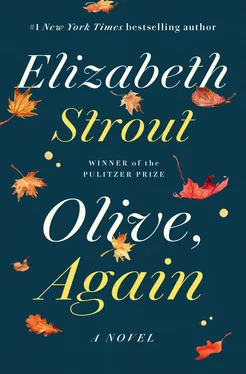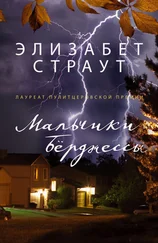“How? I suspect she just…fell. How do I know?”
Jack laughed; he loved this woman. “Well, you know she fell. You know lots of things, Olive.”
“Say, do you know what Bunny Newton told me the other day? Apparently her husband used to know this man who lost his wife, and this man liked this other woman for ten years—even while his wife was still alive—and this other woman, on her birthday, went out and sat down in the middle of the turnpike and got hit and killed. Just sat herself down. Did you ever hear of such a thing? Now the man is mourning her far more than he mourned his wife.”
“So she killed herself?”
“Sounds like that to me. Godfrey, what a way to go.”
“And how old was this woman?”
“Sixty-nine. Oh, and she weighed eighty-seven pounds. So Bunny says. I think it sounds a little crazy to me.”
“It sounds like some piece of information is missing,” Jack said.
“I’m just reporting,” Olive answered. “Oh,” she said, “the woman was filing for divorce. Maybe that’s important, who knows. Crazy.”
“It’s not one of your better stories,” Jack conceded.
“No, it’s not.” After a few minutes Olive said, “I really liked my pedicure, Jack.”
“I’m glad, Olive. You can have another one.”
“I plan on it,” she said.
—
A few days earlier, Jack had come upon Olive in the bedroom, and she had tiny tears coming from her eyes. It was because she couldn’t cut her toenails anymore, not the way she used to be able to, she was too big and too old to get her feet close enough to her, and she hated, she said, she just hated having her toenails so awful-looking. And so Jack had said, “Well, let’s get you a pedicure,” and Olive acted like she barely knew such a thing was possible. “Come on, come on,” Jack said, and he got her in the car and drove her out to Cook’s Corner, where there was a nail salon. “Come on,” he said as she hung back, and so she followed him into the place, and Jack said, “This woman would like a pedicure,” and the small Asian woman said, Yes, yes, okay, this way. Jack said, “I’ll be back,” and waved at Olive, who looked bewildered, but when he went back and picked her up, what a smile she had on her face.
“Jack,” she said, almost breathless, once they were in the car. “Jack, they have one jug of water for one foot, and another jug for the other, well, they’re like little tiny bathtubs, and you just stick your feet in, and the woman, oh, she did a wonderful job—!”
“You’re an easy woman to please,” he had said to her.
And she had said, “You may be the first person to think that.”
Now Olive said, “She rubbed my calves, oh, it felt good. Massaged, that’s the word. She massaged my calves. Lovely.” After another moment she added, “You know that writer who writes all those spooky books—what’s her name—Sharon McDonald—well, she’s just a Bellfield Corners girl, is all she is.”
“What do you mean?” Jack asked.
“I mean, years ago, when she was starting out, she started out her life in Bellfield Corners. That’s all she is, really. Just a Bellfield Corners girl.”
Jack considered this. “Well, maybe that’s why she can write about horror so well.”
“I didn’t know she wrote anything well,” Olive said.
“Boy, are you a snob,” Jack said.
And Olive said, “And you’re a nitwit, if you read her junk.”
“I’ve never read her junk,” Jack said. He did not say that his dead wife, Betsy, used to read everything the woman wrote, there was no point in telling Olive that. They were driving along the river now, and there was a beauty to it, the starkness, the gray ribbon of it right next to the road. “I’m glad we’re taking this drive,” Jack said.
“Oh, me too,” Olive said. Then she said, “ Say , I have a story for you. Bunny and her husband were at Applebee’s the other night, and they were sitting toward the back and there was only one other couple, just as fat as can be, and then the man began to cough, and then he began to throw up—”
“God, Olive.”
“No, listen to this. He kept vomiting, and the woman pulled out these plastic bags and kept apologizing to Bunny while she held these plastic bags for the man to keep puking into.”
“They should have called an ambulance,” Jack said, and Olive said, “That’s what Bunny suggested. But it turned out the man had a medical condition called, oh, what was it called, Zanker’s? Zenker’s diverticu—something, according to the wife, so Bunny and Bill paid their bill, and this poor fat couple sat while he finished throwing up.”
“God,” Jack said. “My God, Olive.”
“Just reporting.” She shrugged.
They were only now entering Shirley Falls, through the back way. The buildings became much closer to one another, and the high wooden houses, built years ago for the millworkers, were there as well, almost on top of one another, with their wooden staircases down the backs of them. Jack peered through the car window and saw a few black women wearing hijabs and long robes walking along the sidewalk. “Jesus,” he said, because the sight surprised him.
“My mother, back in the day,” Olive said, “oh, she hated hearing people speaking French on the city buses here. And of course many of them were speaking French, they had come from Quebec to work in the mills, but, oh, how Mother hated that. Well, times change.” Olive said this cheerfully. “ Look at these people,” she added.
“It’s kind of weird, Olive.” Jack said this, peering to the right and left. “You have to admit. Jesus. It’s like we drove into a nest of them.”
“Did you just say a nest of them?” Olive asked.
“I did.”
“That’s offensive, Jack.”
“I’m sure it is.” But he felt slightly ashamed, and he said, “Okay, I shouldn’t have put it that way.”
They drove through the town, which seemed to Jack to be very bleak, and then they drove across the river and up a long hill where there were houses in neighborhoods. “Turn, turn, right there,” Olive demanded, so Jack turned right and they drove down the street and she showed him the house that Henry had grown up in.
“Nice,” Jack said. He didn’t really care where Holy Henry had grown up. But he made himself look, and consider, and it seemed the right place for Henry to have been raised. The house was a small two-story, dark-green, with a huge maple tree on its front lawn.
“Henry planted that tree when he was four years old,” Olive said. “He did.” She nodded. “He found this tiny sapling and he decided to stick it in the ground, and his mother—old horror—apparently helped him water it when it was tiny, and now there it is.”
“Very nice,” said Jack.
“You don’t care,” Olive said. “Well, never mind, let’s go.”
Jack made himself look around the little neighborhood, and he said, “I care, Olive. Where do you want to go now?”
And she said out to West Annett, where she had grown up, so he drove the car while she directed him, and they went along a narrow road, past many fields that were still oddly green for November, and the sun slanted across them with that horrifying gorgeousness. They drove and drove, and Olive told him about the one-room schoolhouse her mother had taught in, how her mother had had to come early to get the fire started in the winter, she told him about the Finnish woman who used to watch her—watch Olive—when Olive was too small to go to school, she told him about her Uncle George, who was a drunk and who had married a young wife and the young wife fell in love with a neighbor—“Right there, that house right there”—and then the neighbor, well, Olive didn’t know what went on with him, but the young wife had hanged herself at the bottom of her cellar stairs.
Читать дальше












